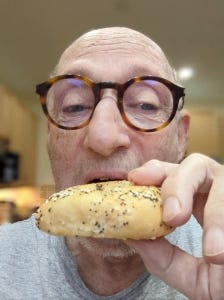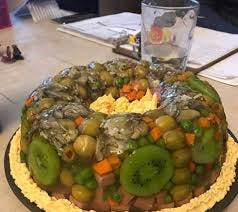Food conjures different emotions and has different meanings for people. Food can be fun. Food can be comforting. Food can be connected to holidays. Food can sustain life. Food can be for celebrating. Food can be about family. Food can be about memories. Food can be about your history and traditions.
In a Holocaust survivor family, food is all these things and more. That’s because many Holocaust survivors developed strong feelings towards food after several years of eating very little. My mother spent years in a Ukrainian ghetto where no food was available. She would search through garbage for food scraps such as potato peels. At one point, she traded her only pair of shoes for food. My father was in a Polish ghetto for two years on rationed food. The final three years of the war were spent in concentration camps where the daily diet consisted of imitation coffee, a piece of stale bread and soup that was mostly water.
My parents wolfed down food as quickly as humanly possible. I swear it seemed like they didn’t even chew it before swallowing. It was not a pretty sight. Dad would drink coffee and tea boiling hot, throwing it down his throat. This was a practice that they developed as prisoners. They ate their meagre rations quickly before someone tried to take them away from them. My family developed the same bad habit. The entire family would eat the same way. My wife has always complained about how quickly I eat, but I can’t help it. It’s a bad family trait. I’ve since learned that this was common among Holocaust survivors. Table etiquette was not an asset in the concentration camps.
The only vegetables my dad would eat were cooked carrots and potatoes. We never saw anything green. Mom was an excellent cook and baker and willing to learn new things, but she could only cook the same things day after day. My dad was never interested in trying anything new and, as I’ve mentioned, nothing green. He would tell me, “I no eat grass.” An acceptable meal for him was salted herring with a slice of buttered rye bread. Only years later did I understand my father’s response. Green vegetables were likely a trigger for him. Concentration camp prisoners were so hungry they would even eat grass. To my dad, a salad looked too much like a plate of grass.
Hunger and starvation traumatized my mother. For the rest of her life, food could never be wasted. She would eat food that had gone bad. There were times when dishes were ruined, and none of us would eat them, but my mother would. As a child, our chicken came from poultry stores, and they would sell you the entire chicken. Mom would use the feet to make chicken soup and afterwards eat them. The odd time, my parents would attend a wedding or banquet. The subsequent morning, I would typically ask her how the event was. She never described anything beyond the meal. She provided a detailed description of each dinner course.
One of the descendants that I interviewed for my next book told me that when she was a child, there would be fruit in the refrigerator that got mushy. She wouldn’t eat it. Her mom would turn it into a fruit salad. She still didn't eat it because she knew what it was made from. So, the fruit salad's getting a little old and nasty and her grandmother comes along and puts it in Jello. They just disguise it with one more layer. You don't waste waste food.
Another descendant told me that her father used to sleep with a loaf of bread next to the bed so he would never be hungry. Someone else described how she was pushed to eat more because you never know when you might have to go for sometime without food. She would complain she was getting too much food. Her mom responded that no one complains from too much food. They complain from not enough food. Issues with obesity were a problem for a number of descendants.
My mom always used food to make people happy. When she baked hamantaschen cookies for the Purim holiday, she would fill them with each person’s preference—poppyseed, cherry, chocolate, and prune. When I was older, I bought my mother a wok, and she made Chinese dishes, although she had never been in a Chinese restaurant. For someone who had never tasted Chinese food, she did quite well. There was nothing she wouldn’t try, provided it was kosher. Before my mother worked out of the house, she made her own preserves. She would pickle baby cucumbers, make strawberry jam, and cooked pears bottled in jars and stored in the basement.
We didn’t buy any prepared foods or baked goods besides bagels and rye bread. All the birthday cakes were made in our kitchen. I didn’t know about commercial baked breads like Wonder Bread until my parents owned a business where they sold them. I tried the pre-sliced bread and found it spongy and tasteless. I didn’t understand how people could eat that.
On some holidays, we ate carp, which I found to be a foul-smelling, oily fish. The carp was always fresh. It was so fresh that it was still alive when Dad brought it home from Kensington Market. The fish was kept in our only bathtub until it was ready to give up its life and take a place at our dinner table. Watching a large fish swimming around while sitting on the toilet is quite the spectacle. As it turns out, I discovered later in life that other children of Jewish immigrant parents also had to share their bathtub with a future dinner entrée. There’s even a children’s book called The Carp in the Bathtub.
A Jew Lost in the Wilderness is a reader-supported publication. To receive new posts and support my work, consider becoming a paid subscriber.








As always, thank you for sharing!
Poignant and memorable, Willie. My own mother nearly starved to death as a child; she was a sharecropper's daughter,and worked in the cottonfields during the great depression. No food could ever be thrown out; no scraps could ever be thrown away. If it wasn't eaten, it was to be composted and put back into the garden, which had to always be growing no matter the season. The need for food security was so great, my mother could not live in the city; she had to always have 'a little piece of land' where food could be grown and water could be had' just in case the world became harsh again. It is now a multigenerational legacy, going back to a childhood of abject poverty and need...
I am so glad you find the joy in the sorrow, a memory of bread and love.